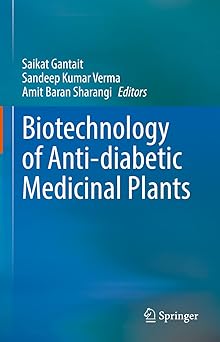
Biotechnology of Anti-diabetic Medicinal Plants
by: Saikat Gantait (Editor),Sandeep Kumar Verma(Editor),Amit Baran Sharangi(Editor)&1more
Publisher: Springer
Edition: 1st ed. 2021
Publication Date: November 13, 2021
Language: English
Print Length: 485 pages
ISBN-10: 9811635285
ISBN-13: 9789811635281
Book Description
This book is a unique overview of insights on the genetic basis of anti-diabetic activity, chemistry, physiology, biotechnology, mode-of-action, as well as cellular mechanisms of anti-diabetic secondary metabolites from medicinal plants. The World Health Organization estimated that 80% of the populations of developing countries rely on traditional medicines, mostly plant drugs, for their primary health care needs. There is an increasing demand for medicinal plants having anti-diabetic potential in both developing and developed countries. The expanding trade in medicinal plants has serious implications on the survival of several plant species, with many under threat to become extinct. This book describes various approaches to conserve these genetic resources. It discusses the whole spectrum of biotechnological tools from micro-propagation for large-scale multiplication, cell-culture techniques to the biosynthesis and enhancement of pharmaceutical compounds in the plants. It alsodiscusses the genetic transformation as well as short- to long-term conservation of plant genetic resources via synthetic seed production and cryopreservation, respectively. The book is enriched with expert contributions from across the globe.This reference book is useful for researchers in the pharmaceutical and biotechnological industries, medicinal chemists, biochemists, botanists, molecular biologists, academicians, students as well as diabetic patients, traditional medicine practitioners, scientists in medicinal and aromatic plants, Ayurveda, Siddha, Unani and other traditional medical practitioners.
This book is a unique overview of insights on the genetic basis of anti-diabetic activity, chemistry, physiology, biotechnology, mode-of-action, as well as cellular mechanisms of anti-diabetic secondary metabolites from medicinal plants. The World Health Organization estimated that 80% of the populations of developing countries rely on traditional medicines, mostly plant drugs, for their primary health care needs. There is an increasing demand for medicinal plants having anti-diabetic potential in both developing and developed countries. The expanding trade in medicinal plants has serious implications on the survival of several plant species, with many under threat to become extinct. This book describes various approaches to conserve these genetic resources. It discusses the whole spectrum of biotechnological tools from micro-propagation for large-scale multiplication, cell-culture techniques to the biosynthesis and enhancement of pharmaceutical compounds in the plants. It alsodiscusses the genetic transformation as well as short- to long-term conservation of plant genetic resources via synthetic seed production and cryopreservation, respectively. The book is enriched with expert contributions from across the globe.This reference book is useful for researchers in the pharmaceutical and biotechnological industries, medicinal chemists, biochemists, botanists, molecular biologists, academicians, students as well as diabetic patients, traditional medicine practitioners, scientists in medicinal and aromatic plants, Ayurveda, Siddha, Unani and other traditional medical practitioners. Read more